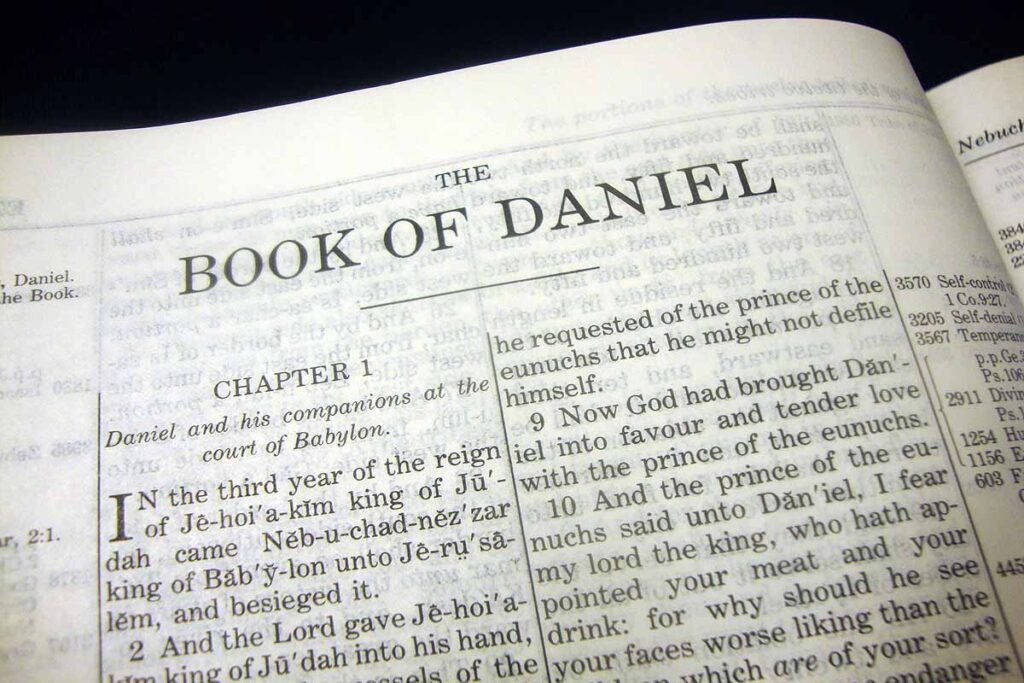While Ezekiel was ministering to the captives in Babylon, Daniel was drafted as a counselor to King Nebuchadnezzar. With God’s help, Daniel interpreted two of the king’s dreams, Daniel’s three friends were rescued from certain death in the fiery furnace, and Daniel was rescued from a lions’ den. Daniel’s life is a picture of the triumph of faith. May God grant us this type of faith so that we may also live courageously each day.
Daniel and his three friends chose not to eat the king’s food. They did not bow down to the king’s image, even under the penalty of death. Daniel continued to pray even though he knew he might be noticed and sentenced to death. These men are inspiring examples for us to live a faithful life in a sinful world. When we face trials, we can expect God to remain present with us through our trials. May God grant us the same courage to remain faithful under pressure.
These visions gave the captives added confidence that God is in control of history. They were to wait patiently and in faith and not to worship the gods of Babylon or accept their way of life, God still rules over human activities. Evil will be overcome, so we should wait patiently and not give in to the temptations and pressures of the sinful way of life around us.
God is sovereign. He was in control in Babylon, and he has been moving in history, controlling the destinies of people ever since. And he is here now! Despite news reports or personal stress, we can be confident that God is in control. As you read Daniel, watch God work and find your security in his sovereignty.
Writer of Daniel
The book of Daniel, named after and written by Daniel in the sixth century B.C., records the events of his life and the visions that he saw from the time of his exile in 605 until the third year of King Cyrus. Daniel, whose name means “God is my Judge,” was a young man of noble blood who was exiled from Judah during the time of King Jehoiakim and lived thereafter at the Babylonian court. After the fall of the Babylonian Empire, he served the Medo-Persian Empire that succeeded it.
Date Written
Both Jewish and Christian tradition has held that the author of this book is Daniel, a Jew who lived during the sixth century B.C. Babylonian exile. Many of the chapters are dated and range from the first year of Nebuchadnezzar’s reign to Cyrus’s third year. But because of its detailed prophecies of events in the middle of the second century B.C. and alleged historical inconsistencies with what scholars know of the sixth-century history, some scholars have argued that the book must be a second-century document, from the time when Antiochus IV Epiphanes was oppressing God’s people. In that case, it would contain “prophecies after the fact,” put into the mouth of a famous historical character rather than being written by Daniel himself. Thus, the visions that “Daniel” saw would attempt to interpret rather than predict history.
To Whom Written
The people of Judah could have interpreted their exile to Babylon as the end of their special relationship with God. But not only does the book of Daniel show them that it is possible to be faithful to even away from the Promised Land, it also shows them that God has not abandoned his plan for the whole world.
Purpose Daniel
To give a historical account of the faithful Jews who lived in captivity and to show how God is in control of heaven and earth, directing forces of nature, the destiny of nations, and the care of his people.
Historical Setting of Daniel
The book of Daniel clearly spans that period of time among God’s covenant people known as the Babylonian captivity. Nebuchadnezzar took captives from Judah on three separate occasions, beginning in 605 B.C. Among his first group taken were Daniel and his companions. Daniel’s prayer to God toward the end of the book (chapter 9) is dated at 538 B.C., the very year that Cyrus of Persia issued his decree making it possible for some of the captives to return to Jerusalem to restore their land and rebuild the Temple (Ezra 1:1-4).
Theological Contribution
The major contribution of the book of Daniel arises from its nature as an apocalyptic prophecy. Highly symbolic in language, the prophecy was related to the events of Daniel’s near future, but even today it contains a message for the future.
Special Consideration
Chapter 9 of Daniel is a fascinating passage; it combines the best of biblical piety and biblical prophecy. Daniel’s study of the prophecy of the 70 years of captivity from the prophet Jeremiah led him to pray for God’s intervention on behalf of His people. The Lord’s answer came through the angel Gabriel, who gave Daniel the prophecy of the seventy weeks, or 70 sevens. The 70 sevens as envisioned by the prophet are usually interpreted as years. Thus, the prophecy deals with the next 490 years in the future of God’s covenant people.
Perhaps the round numbers in this prophecy should be our clue that it is dangerous to try to pin its fulfillment to a specific day or year. But we can say for sure that the end of the 483 years spoken of by Daniel would bring us to the general period of the ministry of the Lord Jesus Christ. The final week in the prophecy is symbolic of the age between the ascension of Jesus and His second coming.
Click here to download or print the Bible outline “Daniel – God’s Plan for the Ages“.





